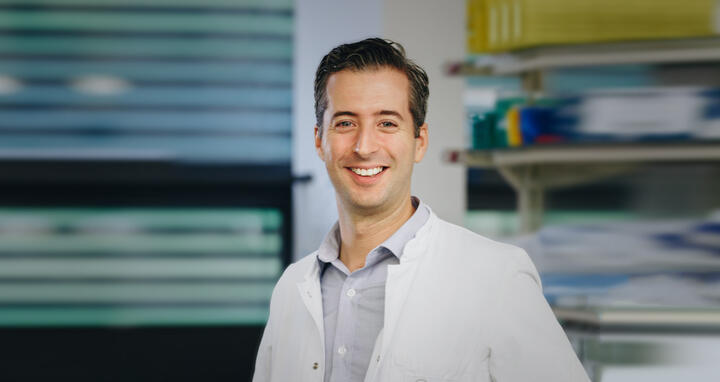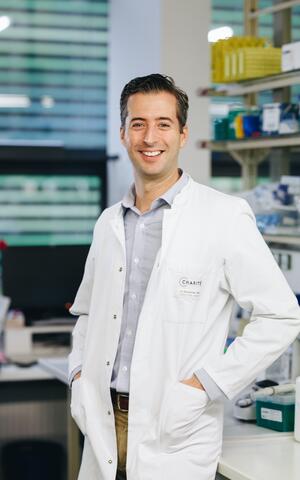Improving cancer treatments for children
Anton G. Henssen
Physicians can apply their knowledge practically by providing bedside medical care or theoretically by advancing basic research – or they can intertwine the two career paths as Anton Henssen has done. The young doctor has specialized in pediatric oncology, a field that focuses on discovering and treating the causes of cancer in children. Since late 2018 he has headed an Emmy Noether Research Group at the ECRC, which at the same time is a guest group at the MDC. He also works as a physician in the Division of Oncology and Hematology in Charité’s Department of Pediatrics.
The cancer specialist is particularly interested in how rare malignant childhood tumors such as sarcomas and neuroblastomas form. He is investigating fundamental genetic changes, while at the same time looking into how his findings can be converted into clinical diagnostics and treatments. “We have discovered, for example, that DNA errors and repair defects can be combated by certain drugs, and we are currently conducting further tests in the laboratory,” reports Anton Henssen. His work at the ECRC focuses primarily on experimental treatments for rare sarcomas, as well as on genetic predispositions for the development of tumors. Henssen is seeking not only to tackle these questions through basic research, but also to set up an outpatient clinic for pediatric oncology at the ECRC. Such a clinic could, for example, provide guidance and counseling to families with genetic predispositions.
Treatment focuses on the individual patient
“I belong to a new generation of doctors who believe it’s important to make current knowledge from research more available to patients,” explains Henssen. An example, he says, is the new technology that enables the sequencing of tumor DNA and even of single cells, thus making it possible to treat patients in a more personalized way. “My work fills a gap because it is often not possible to effectively treat rare or complicated cases with normal therapies,” he said confidently. Henssen and his team are already sequencing the DNA of the entire genome of individual patients in order to facilitate a personalized therapy and consultation. What is crucial here is not the type of tumor, as would be the case in classic oncology, but rather the genome and the associated disease mechanisms.
“Even though there are currently not enough specialists and the technology is too expensive for broad use,” he says, “we are approaching a point where it would make sense to move forward with the technology and establish it as a new standard.” Many young physicians, however, have still not come into contact with this technology and Henssen wants to change that by providing training in his group.
Exchange across disciplinary borders at the MDC
With the ECRC and the MDC, Henssen has found a good place to pursue his goals. “I value highly the interdisciplinary environment and find it important that all clinical disciplines are represented at the ECRC and the MDC,” he says. “After all, cancer can affect all organs – it is therefore necessary to take a holistic view of patients.”
Henssen did not enter the field of oncology until after his doctoral studies. Following training in neuroscience at Forschungszentrum Jülich, he earned his PhD from RWTH Aachen University. As a junior physician at Essen University Hospital he first studied childhood tumors in depth, in particular those that develop from precursor neuronal tissue. A research fellowship then took him to the United States for three years, where he devoted his time to studying tumor DNA sequencing at New York’s Memorial Sloan Kettering Cancer Center, one of the world leading institutions for cancer research. He moved to Berlin in 2016 to further his medical education at Charité as part of the Clinician Scientist Program of the Berlin Institute of Health (BIH) – and to delve deeper into basic oncological research at the ECRC and the MDC.
Author: Wiebke Peters





